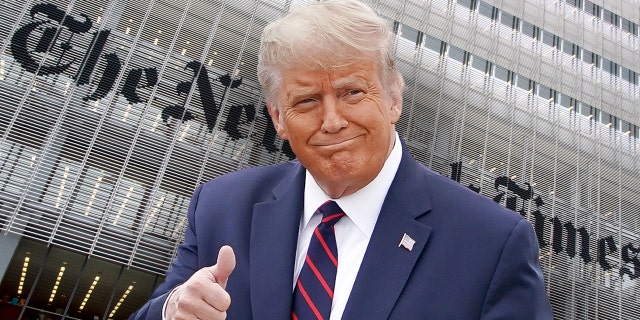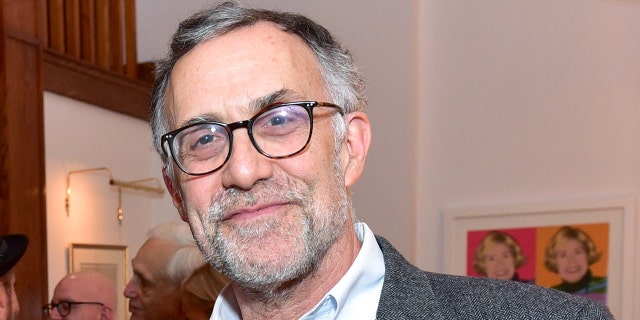The New York Times published a guest essay scolding the mainstream media for its botched coverage of the now-discredited Steele dossier, urging the press to come to terms with "our conduct and whatever collateral damage these errors have caused to our reputation."
Columbia Journalism School professor Bill Grueskin penned the scathing guest essay headlined, "How Did So Much of the Media Get the Steele Dossier So Wrong?"
"Many of the dossier’s allegations have turned out to be fictitious or, at best, unprovable," Grueskin wrote. Journalist Glenn Greenwald praised the piece, tweeting that it "shows the corporate media knows it can't get away with ignoring their major role in this fraud any longer, but is still trying to limit the damage."
WASHINGTON POST CORRECTS, REMOVES REPORTING THAT RELIED ON DISCREDITED ANTI-TRUMP STEELE DOSSIER

The New York Times published a guest essay scolding the mainstream media for its botched coverage of the now-discredited, anti-Trump Steele dossier. (Getty Images / iStock)
"So many journalists were scared to object to the media's recklessness & lies about Trump because they were afraid of being accused of harboring pro-Trump sympathies. So they hopped on board or stayed silent," Greenwald added when sharing Grueskin's op-ed.
Grueskin kicked off his Gray Lady column by pointing out that BuzzFeed first published the raw intelligence file that would eventually become known as the Steele dossier, which provided the roadmap for mainstream media organization to paint former President Trump as compromised by Russia.
"Those who were online that evening remember the jolt. Yes, these were just allegations, but perhaps this was the Rosetta Stone of Trump corruption, touching everything from dodgy real estate negotiations to a sordid hotel-room tryst, all tied together by the president-elect’s obeisance to President Vladimir Putin of Russia," Grueskin wrote.
Grueskin noted the dossier "provided little hard evidence or specific detail," but BuzzFeed published it anyway and "tantalizing tidbits" peppered throughout gave it a "patina of authenticity."
"Any caveats — even BuzzFeed’s own opening description of the allegations as ‘explosive but unverified’ — could be dismissed as a kind of obligatory cautiousness," Grueskin wrote, adding it would "inspire a slew of juicy, and often thinly sourced, articles and commentaries about Mr. Trump and Russia."
The Steele dossier created countless hours of cable news content, as liberal pundits like MSNBC’s Rachel Maddow pushed it at every turn. The dossier also helped push the Russian-collusion narrative and in 2018, the Times won the Pulitzer Prize for "deeply sourced, relentlessly reported coverage in the public interest that dramatically furthered the nation’s understanding of Russian interference in the 2016 presidential election and its connections to the Trump campaign, the President-elect’s transition team and his eventual administration."
The dossier has since been discredited, as Special Counsel John Durham’s investigation into the Trump-Russia probe incited Igor Danchenko, a Russian national who pleaded not guilty Wednesday to making false statements about the source of information that he provided to Steele.

Columbia Journalism School professor Bill Grueskin penned the scathing guest essay headlined, "How Did So Much of the Media Get the Steele Dossier So Wrong?" ( Sean Zanni/Patrick McMullan via Getty Images)
The Washington Post had previously identified Belarusian-American businessman Sergei Millian as a key source of the dossier – "Source D" – that paved the way for corporate media to take the dossier seriously. However, Washington Post reporter Paul Farhi wrote the indictment suggests, "Danchenko may have gotten his information about the hotel encounter not from Millian but from a Democratic Party operative with long-standing ties to Hillary Clinton," noting Clinton ally Charles Dolan, Jr. could be the unnamed operative.
"Now it has been largely discredited by two federal investigations and the indictment of a key source, leaving journalists to reckon how, in the heat of competition, so many were taken in so easily because the dossier seemed to confirm what they already suspected," Grueskin wrote.
The Times guest essay then rattled off some of news organizations that dove right into the dossier.
McClatchy’s Washington bureau falsely reported Michael Cohen secretly visited Prague during the 2016 campaign, MSNBC’s Maddow declared the dossier was fair game simply because it wasn’t "publicly disproven," Slate’s top editor at the time tied Trump’s other "misdeeds" to the dossier despite no true connection and then-Atlantic writer Natasha Bertrand felt accusations made against Trump by adult film star Stormy Daniels made the dossier "much more plausible."
Grueskin then pointed out evidence that resulted in the dossier being discredited before asking, "So where did much of the press go wrong?"
The professor pointed to Trump’s relationship with Putin, eagerness to do business in Russia and choosing Paul Manafort to serve as his campaign chairman as reasons why liberal news organizations could take the dossier as gospel.
"Given all those connections, it was easy to assume that the dossier’s allegations must also be true. The distinction between what journalists assume and what we verify is often the difference between fiction and reality," Grueskin wrote, adding that people like ex-Trump attorney Michael Cohen and Trump himself being "confirmed liars" didn’t exactly help their denials.
"The situation also became complicated because some reporters simply didn’t like or trust Mr. Trump or didn’t want to appear to be on his side," Grueskin wrote. "In a perfect world, journalists would treat people they don’t like the same way they treat those they do like, but this is not a perfect world."

MSNBC’s Rachel Maddow helped pushed the discredited Steele dossier.
Grueskin then cited a New York Times reporter who said, "Plenty of reporters were skeptical of the dossier, but they hesitated to dismiss it, because they didn’t want to look like they were carrying water for Trump or his cronies."
The professor feels "news organizations that uncritically amplified the Steele dossier ought to come to terms with their records, sooner or later," and compared coverage of the dossier to other infamous journalism blunders.
"Newsrooms that can muster an independent, thorough examination of how they handled the Steele dossier story will do their audience, and themselves, a big favor," he wrote.
The Times, which published Grueskin’s piece, has mentioned the dossier in hundreds of stories, including a 2017 guest essay from then-BuzzFeed editor Ben Smith – who now works at the New York Times – justifying his decision to publish it in the first place.
CLICK HERE TO GET THE FOX NEWS APP
Grueskin feels the media needs to come to terms with its conduct and "whatever collateral damage these errors" have caused to the industry’s reputation.
"In the meantime, journalists could follow the advice I once got from Paul Steiger, who was the managing editor of The Journal when I was editing articles for the front page. Several of us went to his office one day, eager to publish a big scoop that he believed wasn’t rock solid," Grueskin wrote. "Mr. Steiger told us to do more reporting — and when we told him that we’d heard competitors’ footsteps, he responded, ‘Well, there are worse things in this world than getting beaten on a story.’"
"Media" - Google News
November 16, 2021 at 10:16PM
https://www.foxnews.com/media/new-york-times-essay-blasts-corporate-media-steele-dossier
Media roasted for coverage of Steele dossier in NY Times, after paper obsessed over collusion for years - Fox News
"Media" - Google News
https://ift.tt/2ybSA8a
https://ift.tt/2WhuDnP
Bagikan Berita Ini















0 Response to "Media roasted for coverage of Steele dossier in NY Times, after paper obsessed over collusion for years - Fox News"
Post a Comment